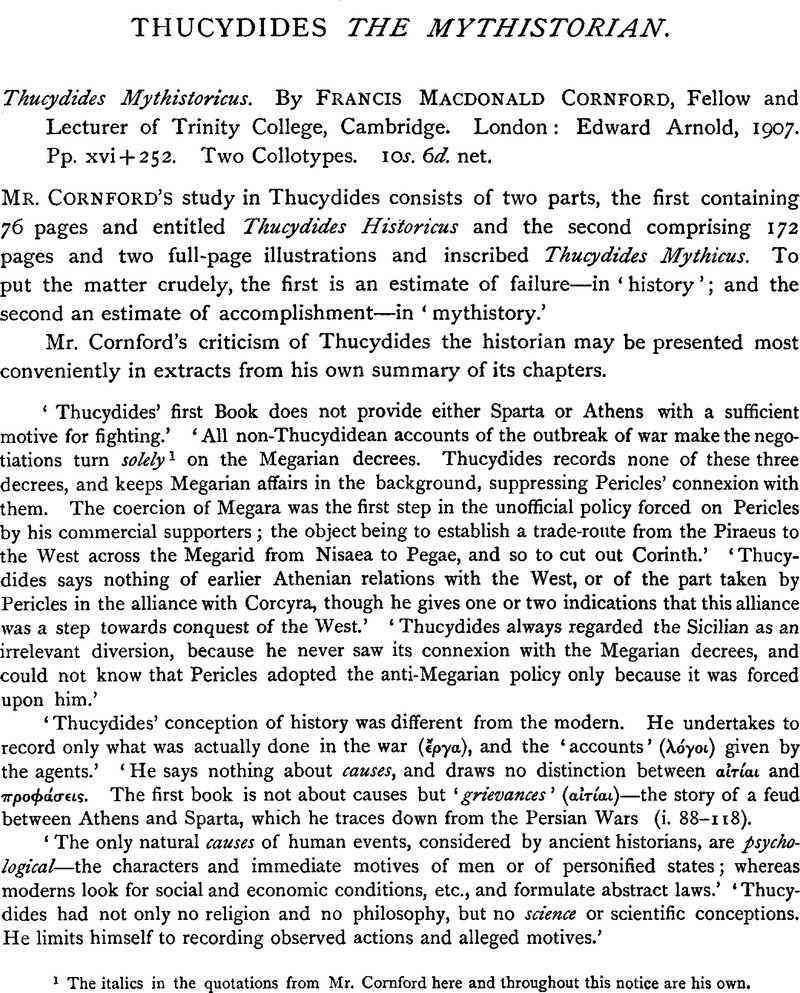Article contents
Thucydides The Mythistorian - Thucydides Mythistoricus. By Francis Macdonald Cornford, Fellow and Lecturer of Trinity College, Cambridge. London: Edward Arnold, 1907. Pp. xvi+252. Two Collotypes, 1Os. 6d. net.
Published online by Cambridge University Press: 11 February 2009
Abstract

- Type
- Reviews
- Information
- Copyright
- Copyright © The Classical Association 1907
References
page 309 note 1 This is not quite exact: but let it pass.
page 310 note 1 ‘Holding Megara, she had a strong frontier against the Peloponnesus, commanding the isthmus from Pagae on the Corinthian to Nisaea on the Saronic bay … Thus [by the building of the Long Walls to Nisaea] the eastern coast-road was under her control, and Attica had a strong bulwark against invasion by land.’–Bury, History of Greece, ch. ix, section 2.
page 310 note 1 Pericles, it should be remembered, was not opposed to the extension of the Athenian empire in itself, but to its extension during the operations of the war. Nor was he opposed to Athenians turning their attention to the West in particular, as he showed by the part he played in the foundation of Thurii.
page 311 note 1 The account of the development of the meaning of in Liddell and Scott is more correct than that inJ. H. H. Schmidt's Griech. Synonymik Caussa (for which I accept Conway's derivation) Verner's Law in Italy, p. 72 and Ger. Sache (Ursache) are also of forensic origin.
page 311 note 2 Epist. ad Pomp. i. p. 777.
page 311 note 3 xxxi (1885), pp. 289 sqq.
page 312 note 1 The influence of Aeschylus upon Thucydides is probably exaggerated by Mr. Cornford. He does not seem to allow for the loss of the major part of contemporary Greek literature.
page 313 note 1 I assume with Mr. Cornford that he was not present in person at the operations in Pylos and Sphacteria.
page 313 note 2 He was strategus in the following year.
page 313 note 3 Especially by Miiller-Strubing in the paper already cited.
page 314 note 1 A similar argument appears in another place. ‘Were those pages written by a man who hated Athens and triumphed in her fall ? We cannot think of any other motive which could have induced Thucydides deliberately to represent as fortuitous a series of events which we, after some reflection, can see to have been in great measure designed’ (p. 97).
page 315 note 1 Thucydides Mythistoricus, p. 80.
page 315 note 2 ![]()
![]()
![]()
page 315 note 3 ![]()
![]() Mr. Cornford indicates personification by means of initial capitals. The use of this modem device in an ancient author has its inconveniences, as I have pointed out elsewhere (Breèl's Semantics, Pref. pp. xxvii sq.), and Mr. Cornford does not escape them. The employment or non-employment of capitals, e.g. in vi. 78. 2
Mr. Cornford indicates personification by means of initial capitals. The use of this modem device in an ancient author has its inconveniences, as I have pointed out elsewhere (Breèl's Semantics, Pref. pp. xxvii sq.), and Mr. Cornford does not escape them. The employment or non-employment of capitals, e.g. in vi. 78. 2 ![]()
![]()
![]() (p. 105, n. l), and Sophocles Antigone (616) is arbitrary: indeed the capital in the last case (ʼΑπάτη) is grammatically hardly intelligible.
(p. 105, n. l), and Sophocles Antigone (616) is arbitrary: indeed the capital in the last case (ʼΑπάτη) is grammatically hardly intelligible.
page 316 note 1 Mr. Cornford's method is substantially the same as Müller-Strübing's (l.c. 311 sqq.) in regard to certain incidents of the siege of Plataea.
- 2
- Cited by




